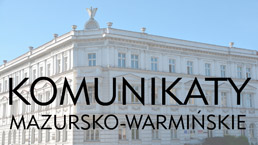Current issue
Online first
Special issues
Archive
About the Journal
Editorial Board
Editorial Council
Reviewers
Editorial guidelines
Publication ethics
Guidelines for reviewing
Remarks on “ghostwriting”
Copyrights and Open Access rule
GDPR Privacy Notice – for the authors of articles sent for publication in the "Komunikaty Mazursko-Warmińskie ("Masuro-Warmian Bulletin")
Contact
Price list
Bezławki – several additional sources regarding the late medieval settlement
complex on the periphery of Prussian lands
Online publication date: 2016-05-08
Publication date: 2016-05-08
KMW 2016;291(1):31-54
KEYWORDS
Late Middle AgesLate Middle Ages PrussiaTeutonic Ordersocial historysettlement historyclusters of rural settlementsBezławki
TOPICS
ABSTRACT
This article contributes to our knowledge of the late Middle Ages of the village of Bezławki. Based
on sources to date neglected in the scholarly literature, various aspects of the settlement’s functions are presented between 1371 and 1517. From the sources emerges an image of a settlement complex, characterized
by significant legal, settlement, economic and socio-professional differences. The analyzed written sources
(administrative documents and records) testify to the functioning of the village chartered with the ‘Kulm Law’,
where alongside the mayor, peasants, innkeepers, miller and priest lived, or at least owned, the townspeople
and those with ‘free’ status of a noble or non-noble background, with the settlement under the governance of
the Order and later under the ‘free’, so-called new lords deriving from the group of mercenaries who came to
Prussia during the period of warfare in 1454-1466. Within this heterogenous community there were additional
dynamic changes taking place in Bezławki in terms of economic activities and the types of production activities associated with them. Only the structure of the governance and the sovereign control of the inhabitants
of the settlement by the Teutonic Order remained consistent. Such results should prompt restraint in drawing
generic conclusions from single mentions in the sources of individual settlements in late medieval Prussia.
A regularly used method of chronological transplantation of specific information back and forth should be
applied more carefully and rigorously. The example of Bezławki shows that there are cases when individual
elements of the settlement changed much more often than previously thought.
REFERENCES (32)
1.
Acten der Ständetage Preussens unter der Herrschaft des Deutschen Ordens,hrsg.v.M.Toeppen,Bd.II: Die Jahre 1436–1446, Leipzig 1880.
2.
Acten der Ständetage Preussens unter der Herrschaft des Deutschen Ordens,hrsg.v.M.Toeppen, Bd. III: Januar 1447 bis Juli 1453, Leipzig 1882
3.
Acten der Ständetage Preussens unter der Herrschaft des Deutschen Ordens,hrsg.v.M.Toeppen. Bd. IV: August 1453 bis September 1457, Leipzig 1884.
4.
Amtsbücher des Deutschen Ordens um 1450. Pflegeamt zu Seehesten und Vogtei zu Leipe, hrsg. u. bearb. v. C. A. Franzke, J. Sarnowsky, Beihefte zum Preußischen Urkundenbuch, Bd. 3, Göttingen 2015.
5.
Das grosse Ämterbuch des Deutschen Ordens, hrsg. v.W.Ziesemer,Danzig 1921 (repr.:Wiesbaden 1968).
6.
Das Grosse Zinsbuch des Deutschen Ordens (1414–1438), hrsg. v. P. G. Thielen, Marburg 1958.
7.
Das Marienburger Tresslerbuch der Jahre 1399–1409, hrsg. v. E. Joachim, Königsberg i. Pr. 1896 (repr.: Bremerhaven 1973).
8.
Die Chronik Wigands von Marburg. Originalfragmente, lateinische Übersetzung und sonstige Überreste, hrsg. v. Th. Hirsch, Scriptores rerum Prussicarum, Bd. II, Leipzig 1863, s. 429–662 (edycja na ss. 453–662).
9.
Preußisches Urkundenbuch. Politische (allgemeine) Abteilung, Bd. VI, Lief. 2: 1367–1371, hrsg. v. K. Conrad, Marburg 2000.
10.
Regesta historico-diplomatica Ordinis S. Mariae Theutonicorum 1198–1525, Pars II: Regesta Privilegiorum Ordinis S. Mariae Theutonicorum / Regesten der Pergament-Urkunden aus der Zeit des Deutschen Ordens, bearb. u. Mitwirkung zahlreicher Anderer v. E. Joachim, hrsg. v.W. Hubatsch, Göttingen 1948.
11.
Beckherrn C., Verzeichniss der die Stadt Rastenburg betreffenden Urkunden, AM, 1885, Bd. 22: 1885,ss. 505–605 (= repr.: w: Chronologisch geordnete Urkunden der Stadt Rastenburg Ostpr. von 1343–1783 mit Erläuterungen, hrsg. v. H. Kiaulehn, Nordhorn 1982, ss. 11–94).
12.
Brillowski W., Koperkiewicz Arkadiusz, Archaeological and Art History Research in Bezławki. Analysis of Form and Funktion of Small Castle Architecture in the Eastern Part of Teutonic Order’s Lands, w: Castella Maris Baltici X. Finland 24–29.8.2009.
13.
Raseborg, Olavinlinna and Häme Castles, ed.K. Uotila, T. Mikkola,A.-M.Vilkuna,Archaeologia Medii Aevi Finlandiae, vol. XVIII, Saarijärven 2012, ss. 33–43.
15.
Grieser R., Hans von Baysen. Ein Staatsmann aus der Zeit des Niederganges der Ordensherrschaft in Preußen, Deutschland und der Osten, Bd. 4, Leipzig 1936.
16.
Jankelaitienė I.,Prūsų limnonimų struktūra ir kilmė [Struktura i pochodzenie pruskich nazw limnologicznych], Vilnius 2007 (mps).
17.
Kasiske K., Die Siedlungstätigkeit des Deutschen Ordens im östlichen Preußen bis zum Jahre 1410, Einzelschriften der Historischen Kommission für ost- und westpreußische Landesforschung, Bd. 5, Königsberg i. Pr. 1934.
18.
Krosta F., Das städtische Archiv zu Rastenburg und die erste bisher ungedruckte Handfeste der Stadt Rastenburg vom Jahre 1357, AM, 1866, Bd. 3, ss. 79–84.
19.
Kubicki R., Młynarstwo w państwie zakonu krzyżackiego w Prusach w XIII–XV wieku (do 1454 r.), Gdańsk 2012.
20.
Kwiatkowski K.(rec.), Bezławki ‒ ocalić od zniszczenia. Wyniki prac interdyscyplinarnych prowadzonych w latach 2008‒2011, red. Arkadiusz Koperkiewicz, Gdańskie Studia Archeologiczne. Seria Monografie, Nr 3, Gdańsk 2013, OMCTH, 2015, t. 19, ss. 301–310.
21.
Kwiatkowski K., Wojska zakonu niemieckiego w Prusach 1230–1525 (korporacja, jej pruskie władztwo, zbrojni, kultura wojny i aktywność militarna), Dzieje Zakonu Niemieckiego, t. 3, Toruń 2016.
22.
Kwiatkowski K., Zakon niemiecki jako „corporatio militaris”, cz. I: Korporacja i krąg przynależących do niej.Kulturowe i społeczne podstawy działalności militarnej zakonu w Prusach (do początku XV wieku), Dzieje Zakonu Niemieckiego, t. 1, Toruń 2012.
23.
Nowakiewicz T., Grodzisko w Bezławkach jako element średniowiecznej sieci osadniczej w Prusach krzyżackich, w: Bezławki ‒ ocalić od zniszczenia. Wyniki prac interdyscyplinarnych prowadzonych w latach 2008‒2011, red. A. Koperkiewicz, Gdańskie Studia Archeologiczne. Seria Monografie, Nr 3, Gdańsk 2013, ss. 235–248.
24.
Nowakiewicz T., Rudnicki Marcin, Brakteaty krzyżackie z grodziska w Bezławkach (przyczynek do znajomości pruskich systemów osadniczych w Państwie Zakonnym), Światowid, 2002, t. 4 (45), fasc. B, ss. 165–171.
25.
Paszkiewicz B., Brakteaty – pieniądz średniowiecznych Prus, Złota Seria Uniwersytetu Wrocławskiego, t. 3,Wrocław 2009.
26.
Paszkiewicz B., La monnoye des Prussenayres – monety z Bezławek, w: Bezławki ‒ ocalić od zniszczenia. Wyniki prac interdyscyplinarnych prowadzonych w latach 2008‒2011, red. A. Koperkiewicz, Gdańskie Studia Archeologiczne. Seria Monografie, Nr 3, Gdańsk 2013, ss. 185–219.
27.
Patze H., Die deutsche bauerliche Gemeinde im Ordensstaat Preussen, w: Die Anfänge der Landgemeinde und ihr Wesen, hrsg. v. Konstanzer Arbeitskreis für mittelalterliche Geschichte, Bd. II, Vorträge und Forschungen, Bd. VIII/II, Konstanz 1964; Stuttgart 2.1986, ss. 149‒200.
28.
Radoch M., Kilka uwag o ojcu Jana Bażyńskiego – Piotrze, w: Szkice z dziejów Ostródy i okolic, red. R. Sajkowski, Ostróda 2003, ss. 69–73.
29.
Radoch M., Wydatki wielkiego mistrza Konrada von Jungingen na zdobycie Żmudzi w latach 1398–1401 (w świetle księgi podskarbiego malborskiego), KMW, 2006, nr 4 (254), ss. 461–495.
30.
Szczepański S., Bezławki i okolice w kontekście osadniczym plemiennej Barcji oraz kętrzyńskiego okręgu prokuratorskiego w średniowieczu, w: Bezławki ‒ ocalić od zniszczenia. Wyniki prac interdyscyplinarnych prowadzonych w latach 2008‒2011, red. A. Koperkiewicz, Gdańskie Studia Archeologiczne. Seria Monografie, Nr 3, Gdańsk 2013, ss. 14–37.
31.
Vercamer G., Siedlungs-, Sozial- und Verwaltungsgeschichte der Komturei Königsberg in Preußen (13.–16. Jahrhundert), Einzelschriften der Historischen Kommission für ost- und westpreußische Landesforschung, Bd. 29, Marburg 2010.
32.
Wakuluk L., Osadnictwo i sieć parafialna kętrzyńskiego okręgu protokomturskiego w XIV–XV wieku, KMW, 1976, nr 3 (133), ss. 375–394.
CITATIONS (1):
1.
Zamek w Bezławkach i jego domniemywane funkcje administracyjne
Krzysztof Kwiatkowski
Studia Warmińskie
Krzysztof Kwiatkowski
Studia Warmińskie
Share
RELATED ARTICLE
We process personal data collected when visiting the website. The function of obtaining information about users and their behavior is carried out by voluntarily entered information in forms and saving cookies in end devices. Data, including cookies, are used to provide services, improve the user experience and to analyze the traffic in accordance with the Privacy policy. Data are also collected and processed by Google Analytics tool (more).
You can change cookies settings in your browser. Restricted use of cookies in the browser configuration may affect some functionalities of the website.
You can change cookies settings in your browser. Restricted use of cookies in the browser configuration may affect some functionalities of the website.




